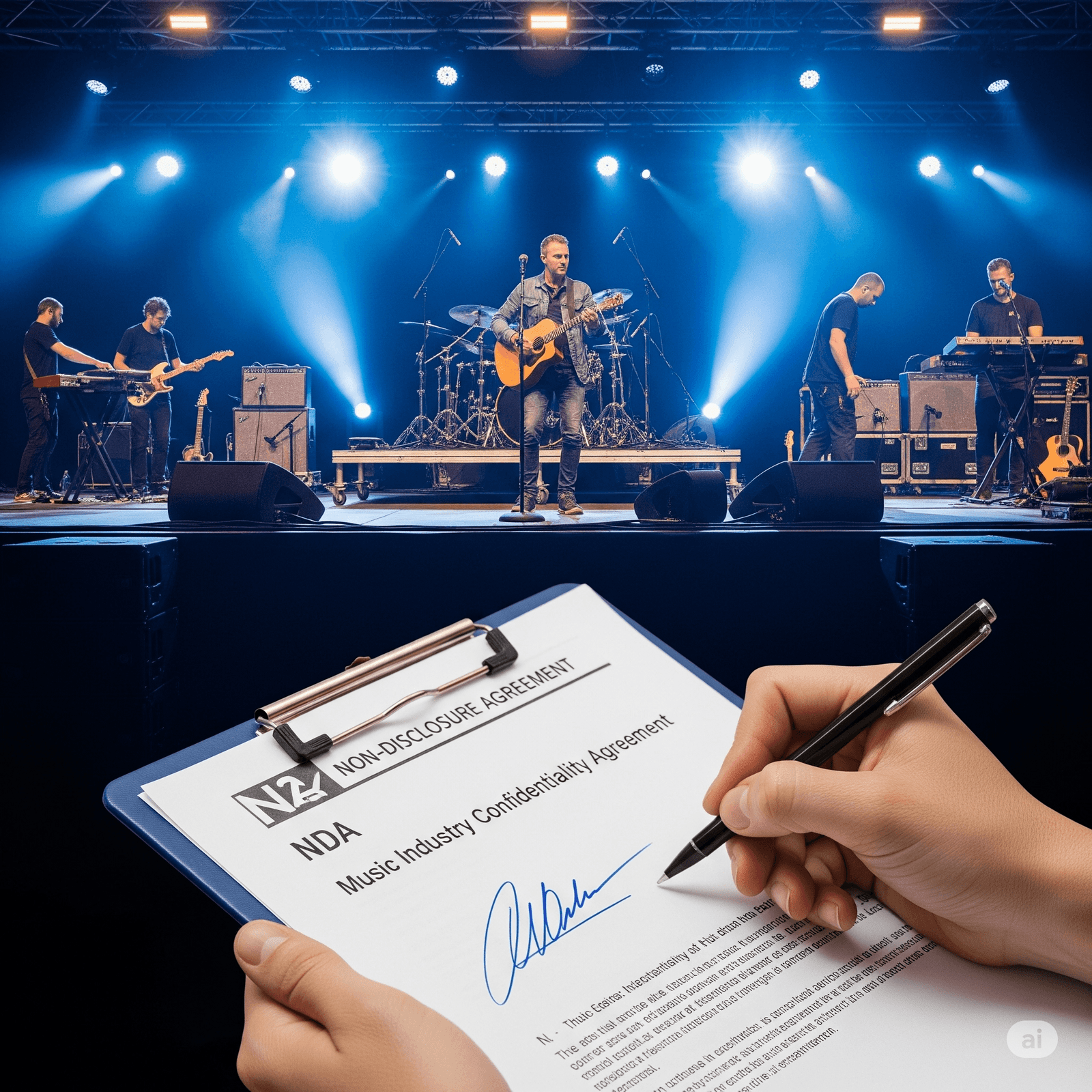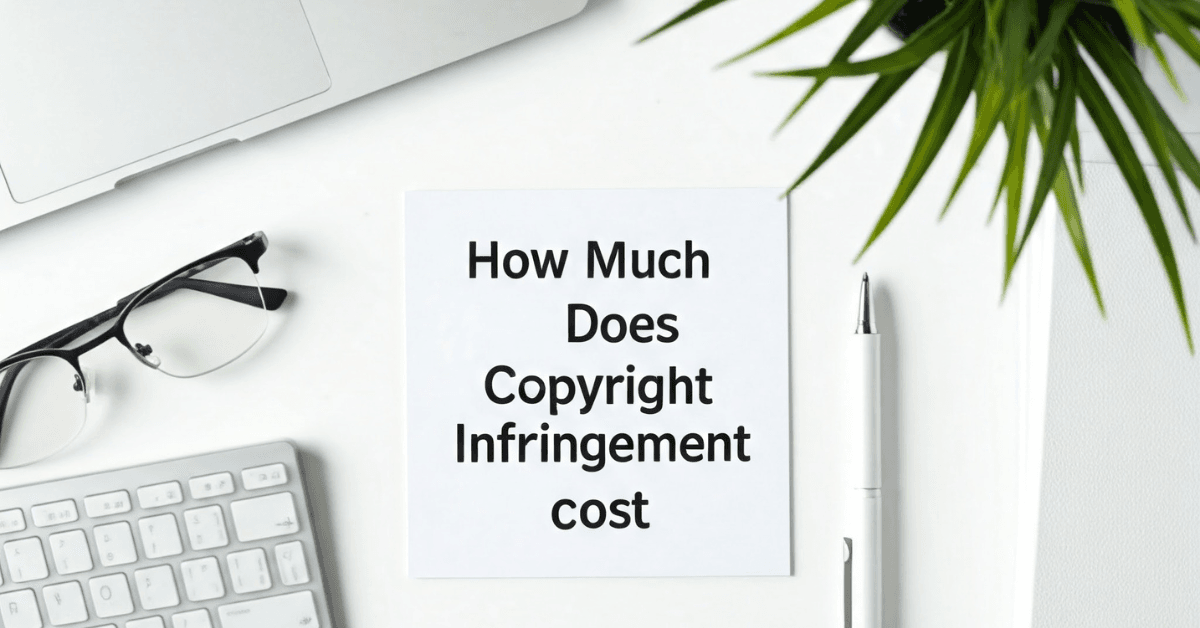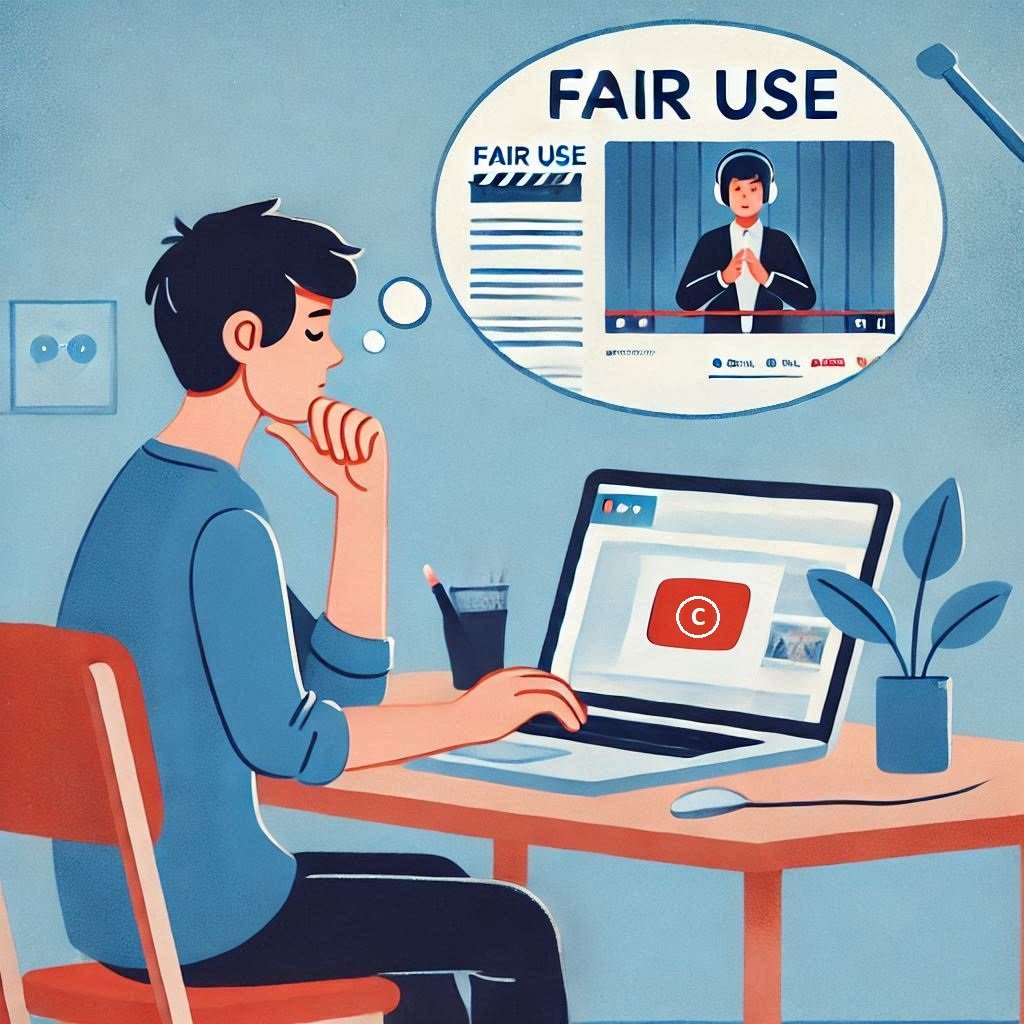The music industry is a vibrant world of creativity, teamwork, and big dreams. Whether you’re a roadie setting up stages, a producer crafting beats, or an artist creating your next hit, keeping secrets safe is a must. That’s where a Non-Disclosure Agreement in the Music Industry (NDA) comes in. This legal tool, often called a Music Industry NDA, protects sensitive details like unreleased songs or tour plans.
In this guide, we’ll explain what an NDA in the music industry is, why it’s important, and how it works, with real examples and tips to help you navigate music industry contracts.
What Is a Non-Disclosure Agreement in the Music Industry?
A Non-Disclosure Agreement in the Music Industry is a legal contract that keeps private information under wraps. It stops people from sharing secrets with others who shouldn’t know. In the music world, NDAs for musicians, producers, or crew members protect things like:
- Unreleased songs or music videos
- Tour schedules or marketing plans
- Personal details about an artist’s life
For example, if you’re a sound engineer working on a pop star’s album, you might hear tracks before they’re released. A Music Industry NDA ensures you don’t leak those songs or talk about the artist’s plans, keeping artist privacy safe.
Real-World Example: Beyoncé’s Surprise Album
Beyoncé’s self-titled album, released on December 13, 2013, was a surprise drop with no prior announcement. Her team used strict confidentiality agreements (NDAs) to prevent leaks, ensuring the album’s secrecy until its release.
This strategy contributed to its record-breaking success, making it the fastest-selling album in iTunes history at the time.
NDAs are commonly used in the music industry to protect unreleased projects and maximize impact.
Why Are NDAs Important in the Music Industry?
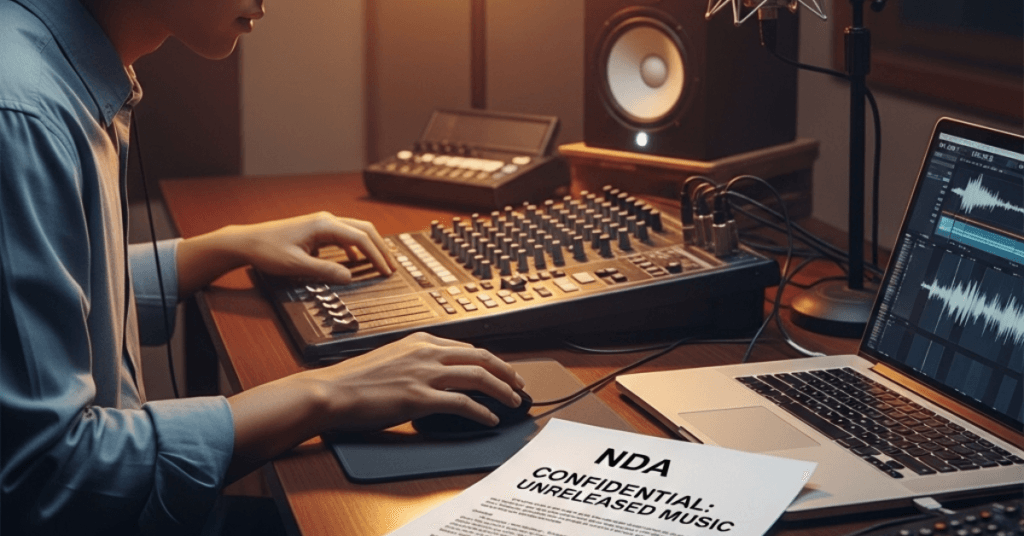
Confidentiality in the music industry is crucial for trust and success. Here’s why Music Industry NDAs matter:
- Protect Artist Privacy: Artists share personal info, like travel plans or family details, with their team. An NDA keeps crew members from spilling these to fans or media.
- Safeguard Intellectual Property in Music: Unreleased tracks, lyrics, or video ideas are valuable. NDAs stop leaks that could lead to theft or lost profits.
- Build Trust: Signing a crew member NDA creates a safe space for artists and teams to collaborate without worry.
- Prevent Financial Loss: A leaked song or tour plan can ruin a surprise release, costing millions. NDAs offer legal protection if someone breaks the rules.
Case Example: Kanye West’s Leaked Tracks
In 2019, Kanye West dealt with leaked tracks from his unreleased album Yandhi. While not directly tied to an NDA, this case shows why protecting unreleased music matters. A strong Music Industry NDA could have set clear rules, possibly preventing the leak and saving Kanye’s team from headaches.
Key Parts of a Music Industry NDA
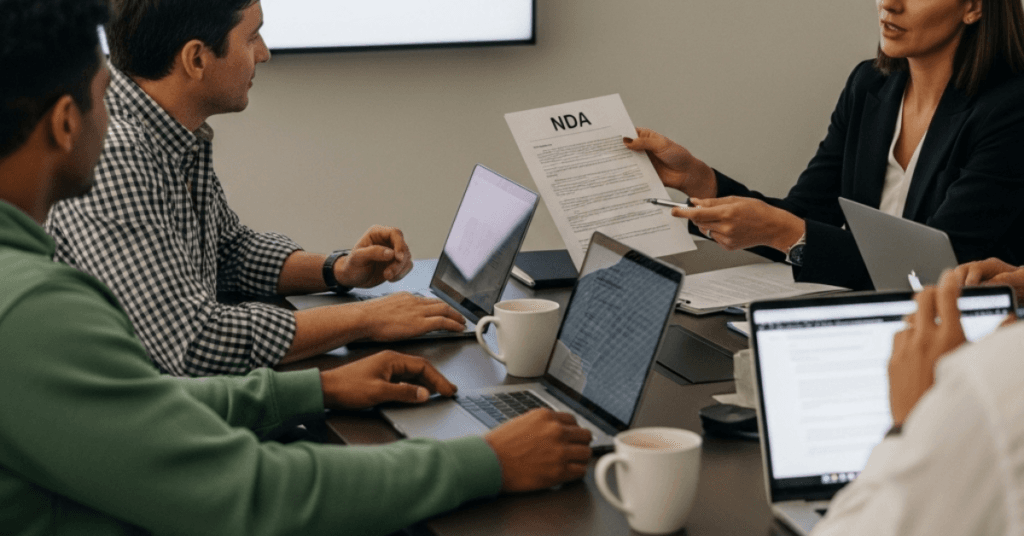
A Non-Disclosure Agreement in the Music Industry includes key elements to ensure full protection. Here’s what’s typically in music industry contracts:
- What’s Considered Confidential:
- Personal info, like an artist’s schedule or private life.
- Professional details, such as tour dates, marketing plans, or unreleased music.
- Communications, like emails or texts with the artist.
- No Sharing Allowed:
- You can’t post about the artist’s work on social media like Instagram or TikTok.
- You can’t discuss details with friends, family, or anyone outside the team.
- Protecting Intellectual Property in Music:
- Covers creative work like lyrics, recordings, or video concepts.
- Bans copying or sharing these without permission.
- Legal Consequences of Breaching an NDA:
- Breaking an NDA can lead to lawsuits, fines, or orders to stop sharing info.
- For example, leaking a tour setlist could cost you thousands in damages.
- How Long It Lasts:
- Confidentiality often continues forever, even after you stop working with the artist, ensuring long-term artist privacy.
Example: A Roadie’s NDA
Picture yourself as a roadie for a band like Imagine Dragons. You sign a crew member NDA promising not to share their setlist or backstage secrets. If you post a video on TikTok showing their surprise encore song, you could face a lawsuit for breaching the Music Industry NDA, owing big money for damages.
Tips for Signing an NDA as a Music Professional
Whether you’re signing an NDA for musicians or a crew member NDA, these tips will help you handle music industry confidentiality agreements like a pro:
- Read Carefully: Check what’s protected and the penalties for breaking the NDA. Take your time to avoid surprises.
- Get Legal Advice: A lawyer can explain tricky terms and ensure the Music Industry NDA is fair. For instance, some NDAs might be too strict, limiting you unfairly.
- Ask Questions: If terms like “indefinite confidentiality” confuse you, ask the artist’s team to explain before you sign.
- Secure Your Tech: Store sensitive files, like tour schedules or demos, on password-protected devices or secure cloud platforms.
- Know Your Rights: Some NDAs might include unfair rules, like restricting public info. A lawyer can help you negotiate better terms.
Case Example: AFM’s NDA Advice
The American Federation of Musicians (AFM) advises reviewing music industry contracts carefully. In one case, AFM helped musicians sign an NDA for a TV show, ensuring it didn’t limit their rights. This shows why legal advice is key for fair music industry confidentiality agreements.
How NDAs Help Artists and Teams
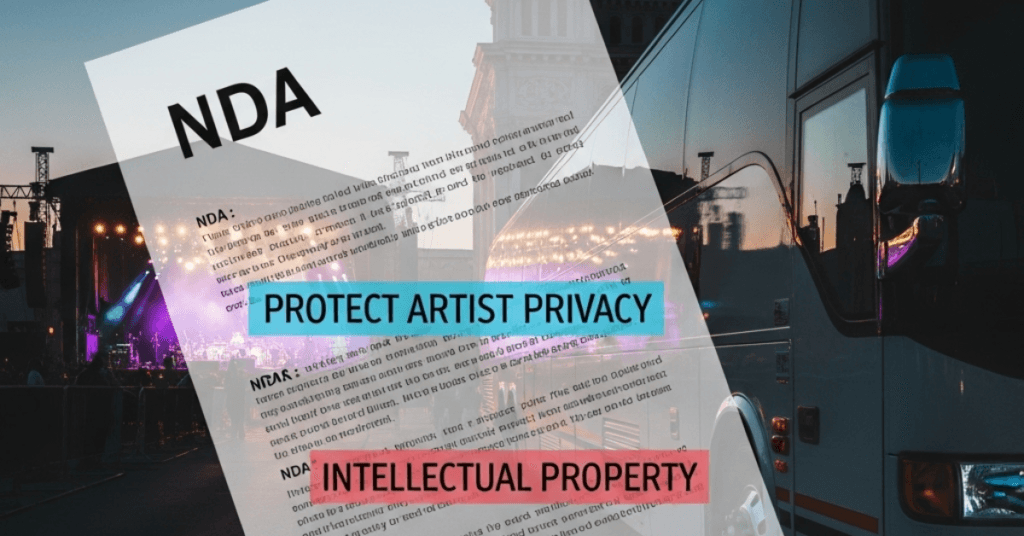
NDAs for musicians and crew create a win-win. For artists, music industry legal agreements protect their creative work, keep surprises secret (like Taylor Swift’s Folklore drop in 2020), and maintain their brand. For team members, signing a crew member NDA shows professionalism, building trust and opening doors to more jobs. By respecting confidentiality in the music industry, you help creativity thrive.
Example: Taylor Swift’s Secret Albums
Taylor Swift’s 2020 albums Folklore and Evermore were surprise hits, kept secret with tight Music Industry NDAs. Her team’s confidentiality ensured massive fan excitement and chart-topping success, proving how NDAs protect artists and their strategies.
Why NDAs Matter in the Music Industry
Understanding Non-Disclosure Agreement in the Music Industry is key for anyone working with artists, from roadies to producers. These music industry contracts protect artist privacy, safeguard intellectual property in music, and build trust in collaborations.
By reading NDAs carefully, getting legal advice, and respecting confidentiality in the music industry, you’ll shine as a trusted professional. Whether you’re hauling gear or mixing tracks, a Music Industry NDA is your promise to keep the music world’s secrets safe.
Ready to sign your first NDA for musicians? Do it with confidence, knowing you’re protecting creativity and building a solid reputation in the music industry!

